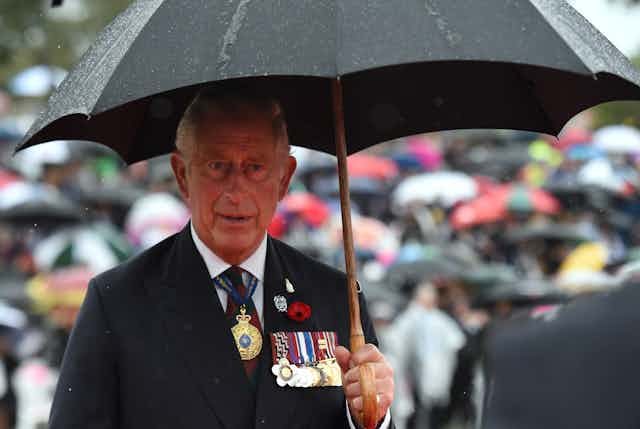Is Prince Charles right to connect climate change to Syrian conflict and terrorism? Yes and No.
In an interview with Sky News, recorded before the Paris terror attacks, Prince Charles suggested there was a direct link between climate change, the Syrian conflict and, ultimately, terrorism.
The heir to the British throne said there was:
Very good evidence indeed that one of the major reasons for this horror in Syria was a drought that lasted for about five or six years, which meant that huge numbers of people in the end had to leave the land because water ran out, their crops failed and so on. And increasingly they came into the cities, already full of Iraqi refugees. And this combined created a very difficult situation.
He then called on the public to deal with the problem causing it: climate change “because the conflict very often comes from movement of people as a result of not being able to survive”.
Right and wrong
For anyone taking a systemic view of the world, it seems self-evident that droughts can have significant social and economic impacts on communities and entire countries, potentially leading to conflict. As historian Mike Davis has argued, severe weather events have contributed to the shaping of the entire modern world system.
So, when Britain’s right-wing press portrays Charles’ link between climate change and conflict as “controversial”, then it seems to be another example of climate sceptics burying their heads in the sand, not wanting to face up to the realities of the 21st century.

There is indeed significant evidence that the 2007−2010 drought in Syria was made worse by climate change. A study in the journal PNAS found it caused “widespread crop failure and a mass migration of farming families to urban centers”. The authors, researchers at Columbia and the University of California, analysed century-long trends in precipitation, temperature, and sea-level pressure in the region, and concluded that the drought was a “consequence of human interference with the climate system”. Of course, conflict always has multiple causes, but climate change, they argued, featured strongly in the Syrian case.
Johan Rockström, the executive director of the Stockholm Resilience Centre, and lead author of the influential planetary boundaries model, recently confirmed this link between climate change and Syria’s civil war and other civil unrest, making his case for the world to take urgent action on cutting carbon emissions.
This is not something radical to say, but obvious. As Prince Charles also mentioned in his interview, even the “Pentagon has actually started to pay attention to this”. In a report released earlier this year, the US Department of Defense did indeed say that:
Global climate change will aggravate problems such as poverty, social tensions, environmental degradation, ineffectual leadership and weak political institutions that threaten stability in a number of countries.
But this is precisely where the problem with Charles’s argument begins.

When Charles says that Syrian climate migrants came into cities “already full of Iraqi refugees”, then he should also acknowledge that the UK government – as well as the Pentagon of course – played a vital role in creating the refugee crisis in the Middle East that has existed ever since the Iraq invasion in 2003.
So if we take a systemic view of the current Syrian civil war, then it is not enough to only look for environmental root causes. We equally need to look at the historical trajectories that have created unprecedented socio-ecological tensions in the Middle East region for centuries.
For example, we should acknowledge the role the Middle East has played in the UK’s and US’s energy security, quenching a thirst for cheap oil throughout the 20th century. The West’s mingling in Middle Eastern politics, often directly or indirectly involving armed conflict and economic interests, is one of the root causes of the current Syrian tragedy.
It is also important to not simply naturalise drought. Droughts have always existed in humanity’s history, and people have developed all sorts of ingenious ways of coping with little water. Droughts are not just made worse by climate change, but also by the way scarce water resources are managed, increasingly for profit. As Lyla Mehta has argued, what is important is to understand people’s basic capabilities when using water, as well as questions of politics, equity and justice. Yes, water shortages are already made worse by climate change, but equally let’s consider the political economy of water, which has played a significant role in the Middle East for many decades.
So, Charles is right to point to the need to see the root causes of the Syrian conflict. Yes, climate change is an important factor, which will only get worse if the world’s leaders do not take radical action at the climate summit in Paris. But let’s not forget history. The current crisis has to be seen in the context of centuries of wars and conflict, often involving vested political and economic interests of the West.
Finger pointing at climate change by environmentalists, whether by Prince Charles or Johan Rockström, is at best simplistic. At worst it is a wilful misrepresentation of the historical realities and concrete political and economic relations that lead to conflict.

